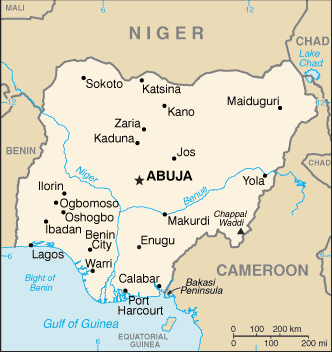Nigeria Background Information
 British influence and control over what would become Nigeria grew through the 19th century. A series of constitutions after World War II granted Nigeria greater autonomy; independence came in 1960. Following nearly 16 years of military rule, a new constitution was adopted in 1999, and a peaceful transition to civilian government was completed. The government faces the daunting task of reforming a petroleum-based economy, whose revenues have been squandered through corruption and mismanagement, and institutionalizing democracy. In addition, the defusing longstanding ethnic and religious tensions are a priority if Nigeria is to build a sound foundation for economic growth and political stability. Although the April 2003 elections were marred by some irregularities, Nigeria is currently experiencing its longest period of civilian rule since independence. General elections in April 2007 were considered significantly flawed by Nigerian and international observers but they marked the first civilian-to-civilian transfer of power in the country's history. President Umaru Musa YAR'ADUA took office on 29 May 2007.
British influence and control over what would become Nigeria grew through the 19th century. A series of constitutions after World War II granted Nigeria greater autonomy; independence came in 1960. Following nearly 16 years of military rule, a new constitution was adopted in 1999, and a peaceful transition to civilian government was completed. The government faces the daunting task of reforming a petroleum-based economy, whose revenues have been squandered through corruption and mismanagement, and institutionalizing democracy. In addition, the defusing longstanding ethnic and religious tensions are a priority if Nigeria is to build a sound foundation for economic growth and political stability. Although the April 2003 elections were marred by some irregularities, Nigeria is currently experiencing its longest period of civilian rule since independence. General elections in April 2007 were considered significantly flawed by Nigerian and international observers but they marked the first civilian-to-civilian transfer of power in the country's history. President Umaru Musa YAR'ADUA took office on 29 May 2007.